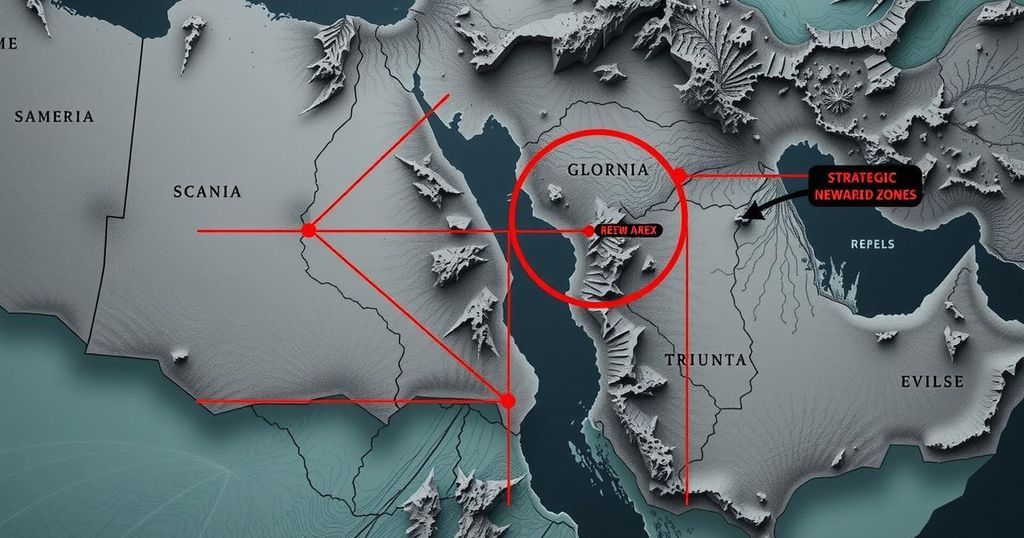U.S. Airstrikes Target Houthi Forces: Implications for Iranian Influence and Regional Stability

U.S. airstrikes targeted Houthi military capabilities, aiming to weaken ties to the Iranian regime. Although the Houthis reported extensive casualties, U.S. officials emphasized their operations focus on American interests, with a warning directed at Iran. The ongoing military campaign aims to eliminate the Houthi threat and address Iranian interventions, amidst rising concerns over Iran’s nuclear program.
In recent U.S. airstrikes, over thirty Houthi targets were neutralized, affecting drone, missile, and air defense systems. Joint Staff Director for Operations, Lt. Gen. Alexus Grynkewich, reported that these strikes resulted in numerous military casualties but no credible civilian casualties. The targeted sites included terrorist training facilities, UAV infrastructure, weapons manufacturing, and storage sites, aimed at degrading Houthi capabilities significantly.
The Houthi rebels reported 53 fatalities, including five children, as retaliatory attacks continued from Saturday into Monday. Pentagon spokesperson Sean Parnell emphasized that attacking American troops will have consequences and clarified that the actions are not aimed at regime change but focus on U.S. interests. President Donald Trump clarified that any retaliation by the Houthis would implicate Iran as the responsible party for such actions.
Trump asserted that further attacks by Houthis would be met with significant retaliation, stating that Iran is in control of their actions by providing arms and intelligence. The Houthis had temporarily ceased strikes in January but announced the resumption aimed at pressuring Israel for humanitarian aid in Gaza. Trump attempted diplomatic engagement but faced refusal from Iran, which expressed unwillingness to negotiate while facing forthcoming sanctions.
U.S. military operations continue, with Trump pledging overwhelming force until the Houthi threat is eliminated, though what this entails remains ambiguous. Parnell refrained from commenting on potential troop deployment in Yemen, stressing the need to keep adversaries guessing. Zineb Riboua from the Center for Peace and Security noted that the strikes focus on disrupting Iranian supply chains to Houthis but effectiveness hinges on Iranian support.
The Houthis’ previous unsuccessful attacks on U.S. Navy vessels and commercial shipping in the region have led to increasing tensions along crucial trade routes. The U.S.’s response has shifted from limited strikes under the previous administration to more aggressive military campaigns, as stated by Hudson fellow Rebecca Heinrichs. Secretary of State Marco Rubio reported numerous attacks by Houthis on U.S. Navy vessels over the past 18 months.
Iran has distanced itself from accusations linking it directly to Houthi policies, though concerns remain regarding resource expenditure in addressing the Houthis’ actions. Some experts argue that the U.S. should not bear the burden of combatting the Houthis, as their direct impact on American interests appears limited. Others suggest significant U.S. actions may be necessary to manage threats posed by Iran’s influence.
Amid strong military responses, concerns grow over Iran’s nuclear capabilities, with uranium enrichment levels reported to be dangerously close to weapons-grade material. While Tehran maintains that it does not seek nuclear weaponry, the implications of their nuclear advancements continue to pose serious international security challenges.
U.S. airstrikes against Houthi targets signify a strategic shift in military response, focusing on degrading the rebels’ capabilities linked to Iranian support. While President Trump underscores the need for consequences against Iranian involvement, skepticism persists regarding the U.S.’s long-term role in the conflict. The complex dynamics surrounding Iran’s nuclear ambitions further complicate the geopolitical landscape, necessitating vigilant monitoring and strategic diplomatic efforts.
Original Source: www.foxnews.com






